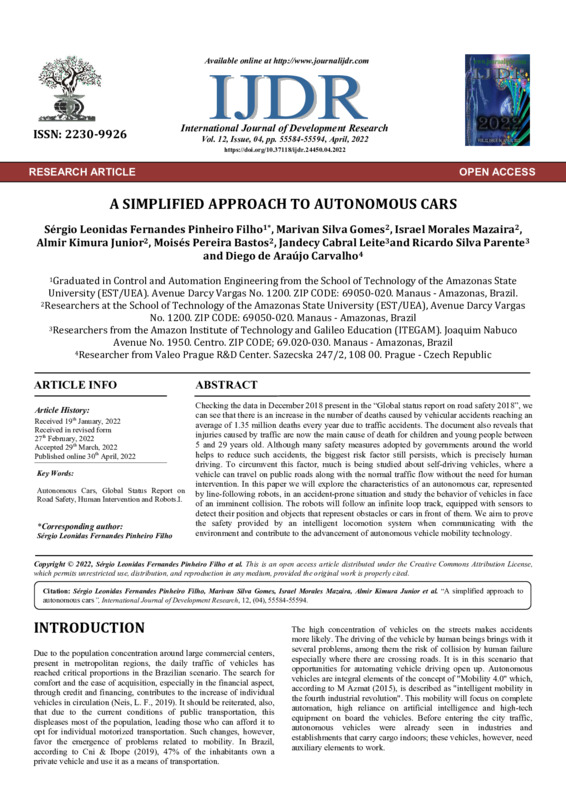A SIMPLIFIED APPROACH TO AUTONOMOUS CARS
Item
-
Tipo do ITEM
-
Artigo Ciêntifico
-
Título do Artigo
-
A SIMPLIFIED APPROACH TO AUTONOMOUS CARS
-
Descrição
-
Checking the data in December 2018 present in the “Global status report on road safety 2018”, we can see that there is an increase in the number of deaths caused by vehicular accidents reaching an average of 1.35 million deaths every year due to traffic accidents. The document also reveals that injuries caused by traffic are now the main cause of death for children and young people between 5 and 29 years old. Although many safety measures adopted by governments around the world helps to reduce such accidents, the biggest risk factor still persists, which is precisely human driving. To circumvent this factor, much is being studied about self-driving vehicles, where a vehicle can travel on public roads along with the normal traffic flow without the need for human intervention. In this paper we will explore the characteristics of an autonomous car, represented by line-following robots, in an accident-prone situation and study the behavior of vehicles in face of an imminent collision. The robots will follow an infinite loop track, equipped with sensors to detect their position and objects that represent obstacles or cars in front of them. We aim to prove the safety provided by an intelligent locomotion system when communicating with the environment and contribute to the advancement of autonomous vehicle mobility technology.
-
Abstract
-
Checking the data in December 2018 present in the “Global status report on road safety 2018”, we can see that there is an increase in the number of deaths caused by vehicular accidents reaching an average of 1.35 million deaths every year due to traffic accidents. The document also reveals that injuries caused by traffic are now the main cause of death for children and young people between 5 and 29 years old. Although many safety measures adopted by governments around the world helps to reduce such accidents, the biggest risk factor still persists, which is precisely human driving. To circumvent this factor, much is being studied about self-driving vehicles, where a vehicle can travel on public roads along with the normal traffic flow without the need for human intervention. In this paper we will explore the characteristics of an autonomous car, represented by line-following robots, in an accident-prone situation and study the behavior of vehicles in face of an imminent collision. The robots will follow an infinite loop track, equipped with sensors to detect their position and objects that represent obstacles or cars in front of them. We aim to prove the safety provided by an intelligent locomotion system when communicating with the environment and contribute to the advancement of autonomous vehicle mobility technology.
-
Língua do arquivo
-
inglês
-
Data da Publicação
-
Ano 2022
-
Palavra-chave
-
Autonomous Cars
-
Global Status Report on Road Safety
-
Human Intervention and Robots.
-
Autores
-
Sérgio Leonidas Fernandes Pinheiro Filho
-
Marivan Silva Gomes
-
Israel Morales Mazaira
-
Almir Kimura Junior
-
Moisés Pereira Bastos
-
Jandecy Cabral Leite
-
Ricardo Silva Parente
-
Diego de Araújo Carvalho
-
Local
-
ITEGAM - MANAUS, 2022


